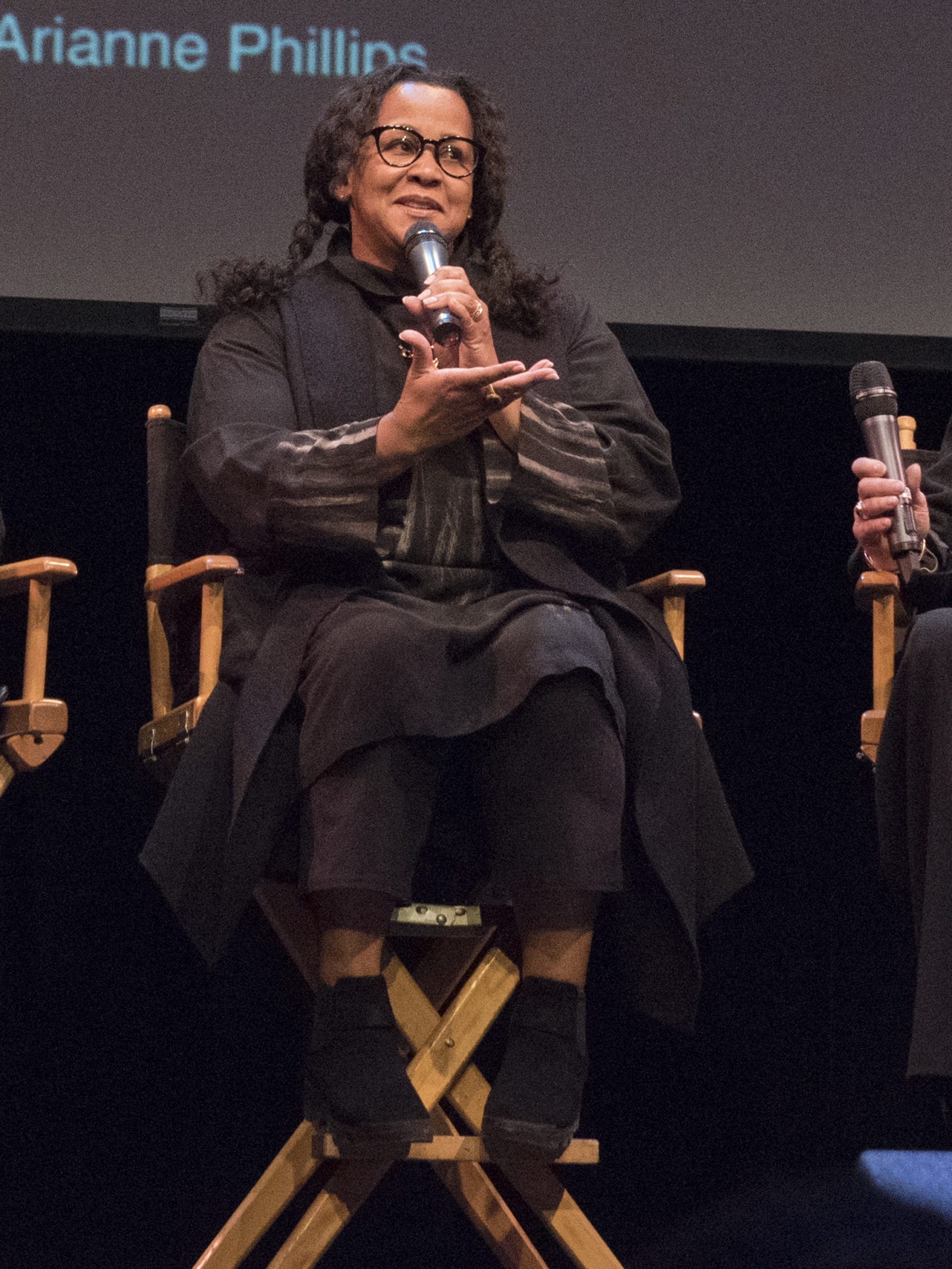(Photo above by Rodin Eckenroth / Getty Images)
Sharen Davis, a multi-Academy Award nominee and HBO’s “Westworld” costume designer, is a new kind of brave.

Los Angeles, CA - February 25: Costume designer Sharen Davis speaks onstage at 7th Annual Sketch to Screen Costume Design Oscar Panel at Schoenberg Hall on February 25, 2017 in Los Angeles, California. (Photo by Rodin Eckenroth/WireImage)
Buddhability: Hi, Sharen. Can you share about how you encountered Buddhism?
Sharen Davis: I’m so grateful for this opportunity to share my experience with you. I have been chanting Nam-myoho-renge-kyo recently to not shy away from speaking about my life. It’s interesting how this opportunity came at this time.
How did I begin? In 1976, I was living in San Francisco, totally heartbroken. I realized that I had been sad most of my life. I was an overachiever, I struggled to speak up, and I felt like I was missing something. That’s when a friend told me, “You know you’re the only person who can make you happy,” and encouraged me to try practicing Buddhism.
Deep down, I knew she was right. Since the philosophy already resonated with the views I grew up with, I figured I’d try chanting. And when I did, it was like I found what I had been looking for all along.
What changed from there?
Sharen: I felt like I could achieve anything with this Buddhism and that I didn’t need anyone’s help. I fought through my sadness and learned that even my negativity could become something of value. These internal changes opened a new path in my career.
For years, I had worked as a costume supervisor for a costume designer in film, and while I had always brought a good attitude to work, I wanted to transition into something more creative. I started chanting to bring my Buddhability to work, and instead of putting others down, I chose to support others, even sharing Buddhism openly with my co-workers.
Then, one day, I got called in by my director. Even though I had no direct experience, he asked me to become the costume designer for an upcoming project, all because of the good things he had heard about me. It was what I had been chanting for!
From there, over the course of a decade, I worked hard and made my way into bigger films. And in 2005, I was nominated for an Academy Award for Best Costume Design for the film Ray.
It was like I found what I had been looking for all along.
Wow. It sounds like this was a major turning point for you.
Sharen: Actually, I felt undeserving of my achievements, and I wanted to lose the nomination.
Also, amid my busy work schedule, I got disconnected from my local SGI Buddhist community. We didn’t have cell phones back then, so I wasn’t sure even how to go about reconnecting. Then, two years later, I was nominated for the same award for the film Dreamgirls. This time, I thought I was ready, but I caved in to all the pressure and found myself desperately chanting not to win. As depression set in, I began isolating myself from friends and family, and escaped into my work.
These were bleak times for me. I felt I had one foot on the gas pedal and the other on the brakes. Although I was getting nominated for various awards, I didn’t enjoy any of it. And I still tried helping others, too, and would often share Buddhism with them. But at the end of the day, since I had lost connection with my Buddhist community, I didn’t know where to direct them to. Even at the height of my career, I didn’t know how to help others, and I felt selfish and unfulfilled.
How did you reconnect?
Sharen: In 2013, I headed to Vancouver, Canada, for a six-month project. I was provided with my own place, so it inspired me to set up a space to chant. I pulled out my gongyo book, my beads and a bell, and as I started chanting, I asked myself, How did you get so lost? I chanted to somehow encounter an SGI Buddhist.
The following day at work, one of my co-workers started sharing about her new Buddhist practice with the SGI and asked if anyone would be interested in coming to a meeting that night. This was it. I immediately said yes!
That night was my first time entering an SGI center in a long time. When I started chanting together with everyone, tears of joy ran down my face. I felt the universe was asking me, Where have you been? The years of desperation and loneliness I had been carrying around was instantly replaced with hope.
What changed this time around?
Sharen: So, when I returned to Los Angeles, I immediately went to an SGI center and got connected to my local SGI-USA neighborhood group. Now that I was connected to other Buddhists again, I felt so alive.
I didn’t want to drift off again, so I chanted to get a job in L.A. And after several interviews, I landed a job for the TV show Westworld, which was being filmed in L.A.! I knew the job was going to be extremely difficult, but as my Buddhist teacher Daisaku Ikeda writes:
One thing is certain: The power of belief, the power of thought, will move reality in the direction of what we believe and how we conceive it. If you really believe you can do something, you can. That is a fact.
My Dear Friends in America, third edition, p. 258
The show was very overwhelming, working seven days a week nonstop. But, this time, I had the support of my Buddhist community and my consistent Buddhist practice.
In 2018, I was nominated for a Primetime Emmy Award for Outstanding Costumes for a Series for Westworld. I didn’t win, but I wasn’t defeated. And the following year, I was nominated for another award by my peers. This time, I immediately chanted to win—for my hardworking crew, for the amazing work and to show proof of this wonderful practice.
We won, and I was overjoyed. More than anything, I felt I had won over my lifelong tendency to think I’m underserving of achievements.

BEVERLY HILLS, CA - FEBRUARY 19: Sharen Davis accepts the Excellence in Sci-Fi / Fantasy Television award for 'Westworld' onstage during The 21st CDGA (Costume Designers Guild Awards) at The Beverly Hilton Hotel on February 19, 2019 in Beverly Hills, California. (Photo by Frazer Harrison/Getty Images)
How do you feel your current position in the film industry connects to this Buddhism?
Sharen: In terms of my personal goals, I’m pushing my own limitations to start producing films. I feel the world needs more films that have a human message, that let us know that there is a future of peace and a society rich in culture and art.
On a day-to-day level, I see a lot of young people who want to get into the film industry, but I see the prevalence of a culture where people put others in a bad light to get ahead.
I understand how difficult it is to see things clearly when we only see our own fears and suffering, so I engage in dialogue with them. I remind them that they don’t have to bring others down to move ahead; instead, they have to find their own courage and use their own life’s potential.
This is really inspiring. As an individual with many dimensions and responsibilities, what do you feel is your purpose, especially with the current state of world?
Sharen: Buddhism teaches that there’s a deeper identity within me as a Bodhisattva of the Earth, a person who cares not only for themselves but the happiness of others. So, I’m going to help anybody and everybody. I can’t pick and choose who because I’m supposed to according to the times. I’m going to help others, regardless, because it’s in my heart.
I’ve had many one-to-one calls with individuals, and I chant each time to connect with them, especially if they hold other beliefs. I believe that we can’t just limit ourselves and that we have to develop mutual understanding.
I am aware that there are few people of color who work as costume designers in the industry. When aspiring designers ask me how I did it, I chant for the interviewer to see me—my heart—not Sharen, a Black person, or Sharen, a woman. Ikeda writes:
When we change our state of life, our view of everything alters. Seen with the eyes of common mortals, a common mortal appears simply as a common mortal; but seen with the eye of the Buddha, ordinary people, just as they are, are Buddhas.
Learning From the Gosho, p. 44
I share with them that I have a Buddhist practice that I engage in every day, every moment, and how it offers a broader, all-encompassing perspective of life. As a Buddhist, I feel it’s my responsibility to courageously use my voice and share about the significance of the SGI, especially having once lost sight of our community.
I felt I had won over my lifelong tendency to think I’m underserving of achievements.
I have confidence that people will take notice when we, ourselves, are grounded in a deeper sense of self. I no longer feel that I’m missing something. So, I chant and put myself out there so that the person just sees me.
